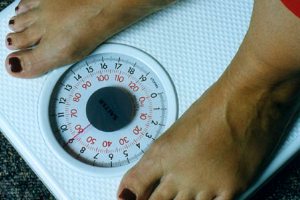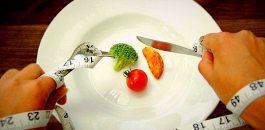Losing weight is a very simple process; eat sensibly and move more.
The web and media are saturated with appealing programmes which promise to launch the ‘new you’ into take-off, but can we really trust all the advice we read?
In a bid to shift the excess weight, an eye of caution is definitely required, especially from fad diets that can draw you in.
As over half of us Britons embark on some kind of weight-loss regime at the beginning of each year, there is a large market waiting to suck us in, and an unregulated danger of being misled into a quagmire of fads and failure.
Marketing campaigns bombard us with new ‘revolutionary’ ways to swiftly shift the pounds, but at what cost? A premium price, or at the cost of our health?
 Not believing everything you read, and taking a pragmatic approach to dieting will steer you towards success.
Not believing everything you read, and taking a pragmatic approach to dieting will steer you towards success.
You may normally consider yourself to be logical; however, a desperate dieter will explore all the realms of possibility and attempt the most dubious weight loss tips.
The media has turned weight loss into a religion, and transformed our thinking into ‘skinny equals happy and healthy’. Adopting extreme methods to achieve our ‘goal’ can become a game we can never win, constantly striving for an effortless solution which doesn’t exist.
From eating ice cubes and chewing cotton balls dipped into orange juice, to laxatives, herbal pills and chemical potions and ludicrous recommendations such as ‘sniffing bananas’, you will become fodder for the latest craze.
You will not only look quite ridiculous with your nose in the fruit bowl, but will also not lose any weight. This diet claims that tricking the brain into believing the body has consumed sodium will therefore diminish your appetite, but really it tricks you into insanity.
 You may think that diets, exercise and our obsession with image is a very modern concept.
You may think that diets, exercise and our obsession with image is a very modern concept.
Surprisingly not; unbelievably baffling concepts for weight loss have been gossiped about and tried out by men and women alike since the Victorian Times.
Before the 21st century, fashionable diets included the cabbage soup and Hollywood syrup diets; the early self-conscious society tried a cigarette diet, which, ironically, promoted a healthy lifestyle, as well as a vinegar diet and even a slimming soap!
These concepts may seem bizarre now, however, they were undertaken as a seemingly very educated route at the time.
While there are some truly absurd diet tips readily available, some of our commonly adopted rules can be just as misleading: stop snacking to lose weight is a big misconception. Granted, if a Big Mac burger is a preferred snack, this habit will need to be curbed, however, better nutritional snacks, like fruit or nuts will keep that hunger cry at bay.
The word diet can make you shudder, and cause you to believe that your loved mid-morning snack is a sinful vice, and you have failed for considering such a comfort. But Mike Clancy, CDN, a personal trainer at David Barton’s Gym in New York City claims:
“Smarter snacks like nuts, fruits, and yogurt will keep your energy levels high throughout the day.”
 Depriving ourselves of favourite foods, and becoming ‘engulfed in the zone’ is a common approach to dieting, but can often be the cause of falling off the ‘fad-wagon’.
Depriving ourselves of favourite foods, and becoming ‘engulfed in the zone’ is a common approach to dieting, but can often be the cause of falling off the ‘fad-wagon’.
However, allowing a treat every now and then will encourage the dieter towards a more sustainable lifestyle.
Dr Batayneh says: “We tend to be in ‘all-or-nothing’ mode when we diet and never seem to find a middle ground. You have to realise that you can’t have pizza, French fries, and chocolate cake all in the same day, but, with careful planning, you can enjoy these foods when they are presented as treats.”
In fact, research shows that moderately indulging in ‘forbidden foods’ is what keeps people from bingeing.
Cutting carbohydrates is a particularly common weight loss tip – one that is sure to make the dieter feel weak, hazy and useless. Just like essential fats there are essential carbohydrates – some are better than others but our body really needs them for the vital daily energy needed for basic everyday tasks.
Experts suggest a minimum of 130 Grams a day, which is a massive stretch from the meagre 20 grams of some ‘low-carb’ diets:
“Short-term effects of such diets include fatigue, constipation and irritability; long term, you could be putting yourself at risk for heart disease and colon cancer,” says Dr Bailey at Yale university.
 Slim fast – what an oxymoron! Shakes and liquid diets will not result in a happier, slimmer you – for every pound lost, two pounds will be added when solid food is returned to your meals, and this will happen because nobody can live on shakes forever.
Slim fast – what an oxymoron! Shakes and liquid diets will not result in a happier, slimmer you – for every pound lost, two pounds will be added when solid food is returned to your meals, and this will happen because nobody can live on shakes forever.
If liquid meals have been a recommended way to lose weight, you may want to consider the amount of muscle you will lose first, causing damage to your bones, and leaving your body vulnerable to conditions such as osteoporosis (brittle bone disease) in later life. We are mindlessly creating bodies that are prone to illness.
The digestive system will take the hardest hit. Long-term use of these liquids, replacing meals, may mean you can never consume a solid again – being fed through a straw is not attractive, even if you are very thin while doing so.
You will not look refreshed and nourished but tired and grey as all essential vitamins and minerals have been evacuated from your skin.
What we put into our bodies can affect us mentally as well as physically, so vigilance should be at the forefront of our diet choices. Choose health over fast results, nutrition over skinniness and balance over deprivation. Losing weight is a very simple process; eat sensibly and move more.
The extremes are very easy to find, and worryingly tempting – often presented with no regulation nor expertise. Whichever diet you choose, be considerate to your body, fair to your mind and kind to your purse.






























































